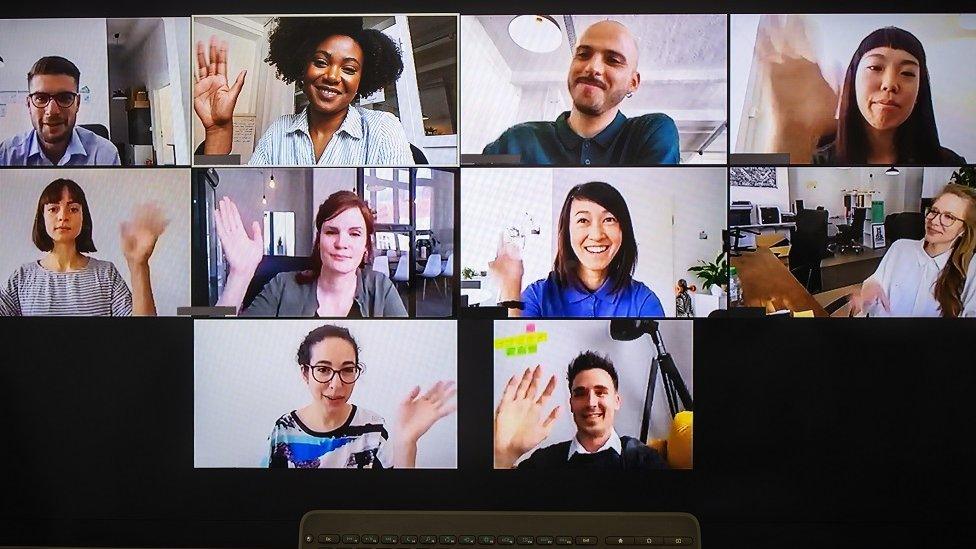Welsh election: Life and work after Covid - what the parties say
- Published
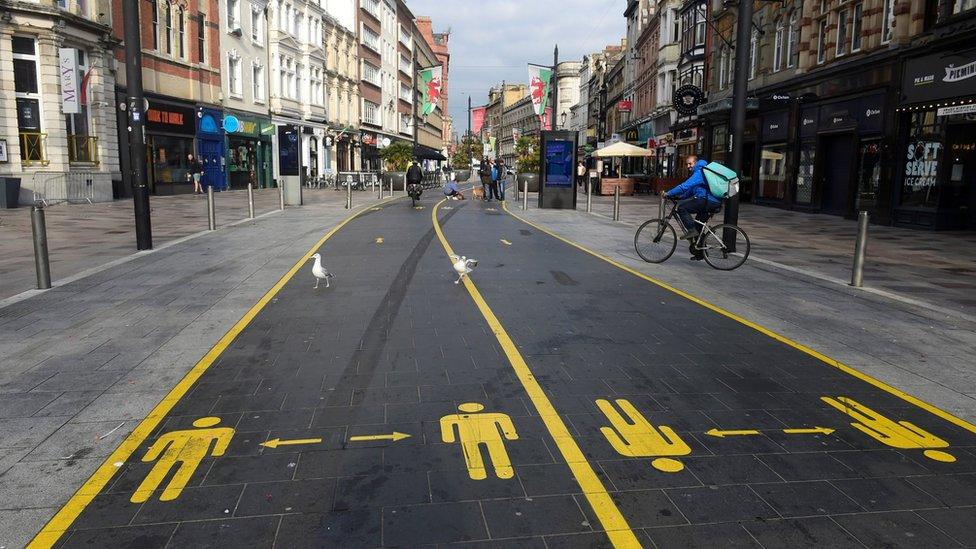
Since the start of the pandemic many of us have been working more flexibly, caring for others and shopping differently.
We don't know what "normal life" will be like in the future but - with just a week left of campaigning for the Senedd elections - I've been asking politicians from the four main parties what they think it will be like to live and work in Wales in five years' time.
How will we work post-pandemic?
Plaid Cymru's leader Adam Price says he wants to reverse the trend of past decades when manufacturing firms left Wales to set up in places like China - where wages are lower - leaving jobs axed in Wales.
"Instead of spending money writing large cheques to luxury brands coming in for a short number of years to set up factories," he says, during our conversation in the town of Abertillery, Blaenau Gwent.
"We should be using that money to back Welsh businesses, Welsh entrepreneurs and innovators who have ideas and start their businesses in communities like this in the valleys."
But the harsh reality for Mr Price is there are many cases of Welsh firms growing and then selling themselves to large UK or international firms.
A lot fewer grow and stay Welsh-owned - and if the ownership moves outside of Wales, so do the profits.
Mr Price promises to help firms stay in Welsh hands as they grow.

SIGN UP FOR WALES ALERTS: Get extra updates on BBC election coverage

The pandemic has been a time for businesses to "take stock", according to Russell George of the Welsh Conservatives.
"We need to capture that entrepreneurial spirit and support those businesses to grow - small to medium, medium to large," he says.
To do that, he proposes setting up an arms-length government body called Innovate Wales.
This isn't an original idea - in the 1980s and 1990s the Welsh Development Agency was that sort of organisation.
Mr George, talking to me outside the Heart of Wales business park in Llandrindod Wells, Powys, wants that body to give every business in Wales an "account manager" to help it grow.
With about 250,000 companies in Wales, that's a vast task - a job creator in itself.
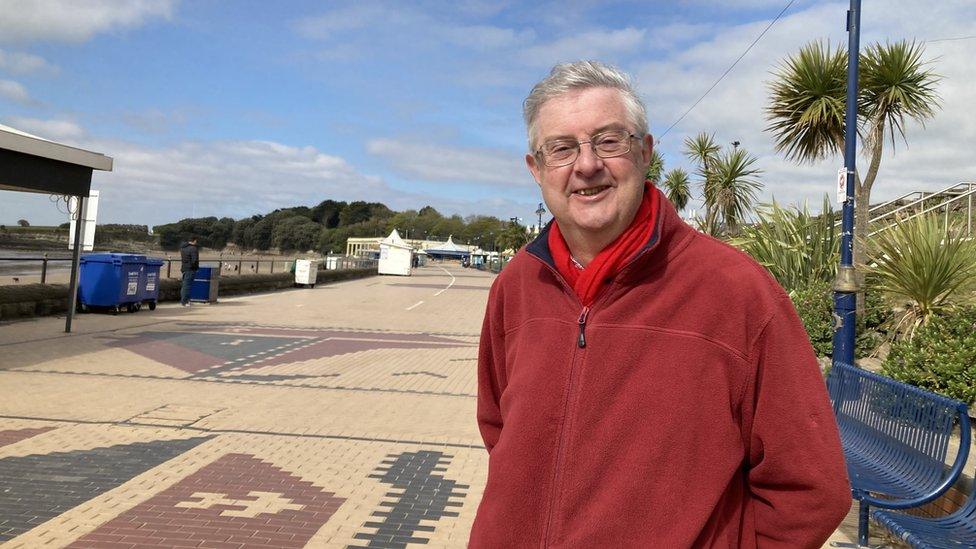
Mark Drakeford says jobs "rooted in local communities" needed protection to avoid being moved abroad
"There will be jobs rooted in the local communities where people live," says Welsh Labour's Mark Drakeford, talking to me at Barry Island.
"Jobs that can't be moved overseas - jobs that perhaps we haven't valued that we should have in the past."
He adds there will also be jobs that use Wales' natural resources, and predicts an energy revolution where homes generate as much energy as they use.
He also believes there should be support for highly-skilled sectors where Wales is already successful, like cyber security.
The Liberal Democrats, meanwhile, plan to invest in making our houses warmer and cheaper to run, which they say would help smaller firms grow.

WALES ELECTION: THE BASICS
What's happening? On 6 May, people will vote to elect 60 Members of the Senedd (MSs). The party that can command the support of a majority of MSs will form the Welsh government. Find out more here.
What powers does the Senedd have? MSs pass laws on aspects of life in Wales such as health, education and transport - and have some tax powers.

"If you retrofit a home, it's cheaper to heat, financially better to sell or rent, it contributes to combating climate emergency and you're training to be able to do that," says leader Jane Dodds.
She says that would benefit small firms to self-employed contractors. Manufacturers would benefit too, she says, as they would make the products needed.
The Lib Dems are bringing back a well-worn phrase: "Brand Wales."
Its message, says Ms Dodds, is that "we are new Wales and we want people to come here to work with us and for us".
But why would they come here?
"Creating opportunities, development grants, good deals to make sure we get specialist skills and specialist companies," she says.
Just as I'm starting to feel like we're going back to the '90s, Ms Dodds tells me she doesn't want to be going back to the days of the Welsh Development Agency - instead she wants to see smaller organisations.
What have we learnt from the pandemic to make flexible working easier?
Before Covid shook up the way we work and live, many thousands of people commuted to offices and call centres miles from where they live.
That was a difficult juggle for people caring for children or older relatives.
"If we've learnt one thing from the pandemic, we no longer need people travelling every day to an office location," says Mr Drakeford.
"We can work equally successfully closer to home - and at home."
His party would also develop hubs where people from all sorts of employers could work nearer their homes.
Is that just useful for professionals in offices? Not according to Mr Drakeford, who says call centres have also shown their teams can work well remotely.
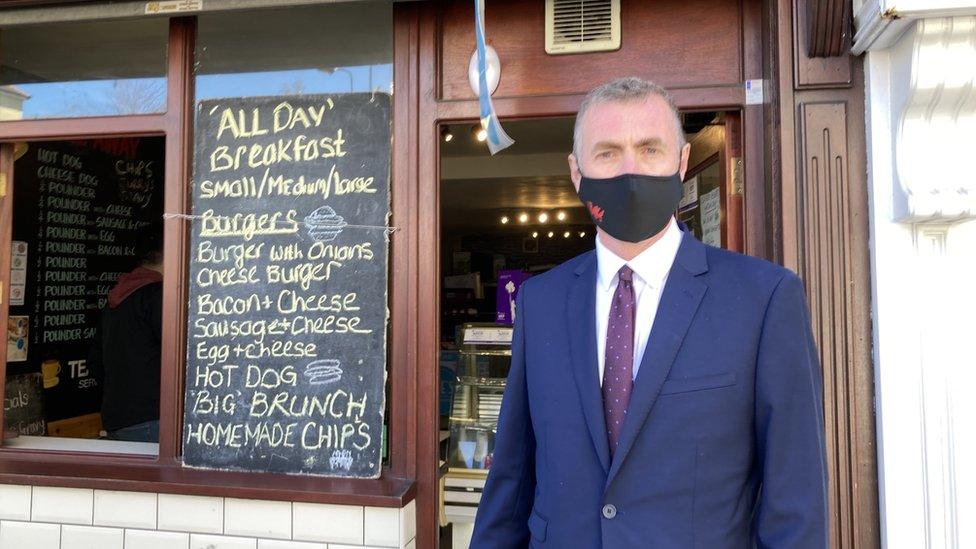
Plaid's Adam Price says hubs - where people from different companies work together - could be based near Metro stops
Plaid Cymru also wants to develop hubs and Mr Price suggests these could be based near stops on the new Metro.
"Most of us in Wales don't live in cities - we live in towns and villages and valleys and we need to have our economic and transport policies reflecting that," he says.
The Lib Dems also want these hubs, adding they could help counteract loneliness and mental health issues from isolation, which have been a big issue during the pandemic.
With investments in the M4, A55 and A40 a Conservative priority, does the party expect as many of us to commute to work as before the pandemic?
Mr George says not.
"You won't just see people going to work, there's haulage moving from one place to another," he says.
He adds people will still probably have to go into their place of work for a couple of days a week, even with a shift to more home working and "you're still going to have huge amounts of traffic on the M4".
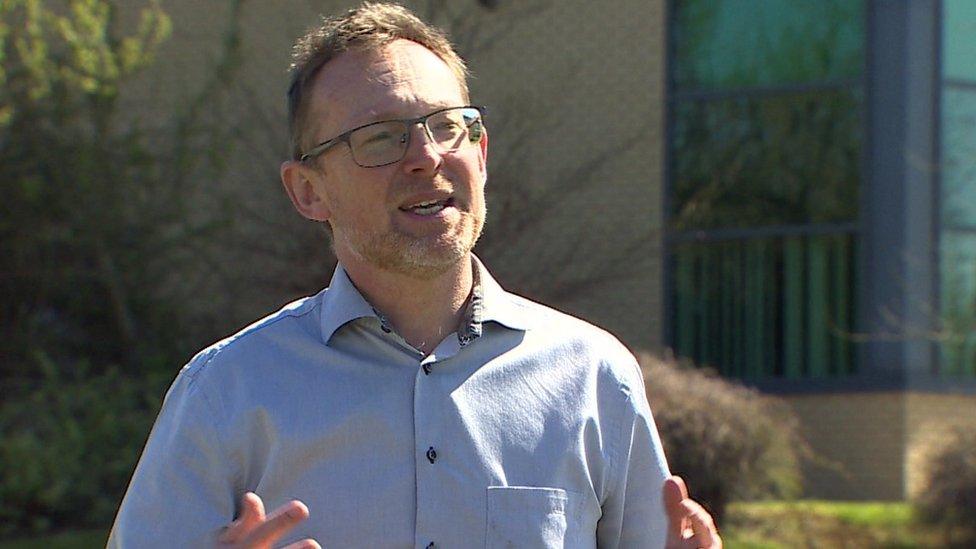
Russell George said he still expected there to be "huge amounts" of traffic on the M4
Mr George believes flexible working benefits businesses "because you get the best out of workers".
He argues, if employers make it possible for parents to work from home and pick children up from school, for example, a wider number of people will want to work for them.
Businesses, he says, "will continue to think differently about how they can operate differently to get a bigger pool of skills".
Ms Dodds wants the change in working hours to be open to everybody.
"There used to be a massive begging - from mainly women - for condensed working hours, for example, but the whole thing has changed," she says.
"But it has to be fair".
What will our high streets look like?
Welsh Labour sees high streets as places where people will work, live and be entertained.
"I don't think the future of the high street is trying to recreate what was there in the past," says Mr Drakeford.
He says centres of towns need a "vitality that lives beyond the working day".
But hasn't the pandemic highlighted how people cherish more space in their homes - and a garden?
He says people want different things at different times in their lives, such as being close to services or entertainment.
Mr Drakeford vows to put new jobs from the public sector on high streets, getting "more people living in the centre of our towns, a mixed approach".
Mr Price, meanwhile, still sees businesses as the heart of high streets - but not large business chains.
He talks of a wave of investment involving "bright people from Wales who have ideas about independent businesses that could transform high streets".
But traditionally Wales has had a relatively low proportion of entrepreneurs.
Mr Price says Wales needs a "business revolution with enterprise and innovation at the core at every level".
He does not need reminding, however, that over the years there have been many programmes to develop an "entrepreneurial spirit" in Wales.
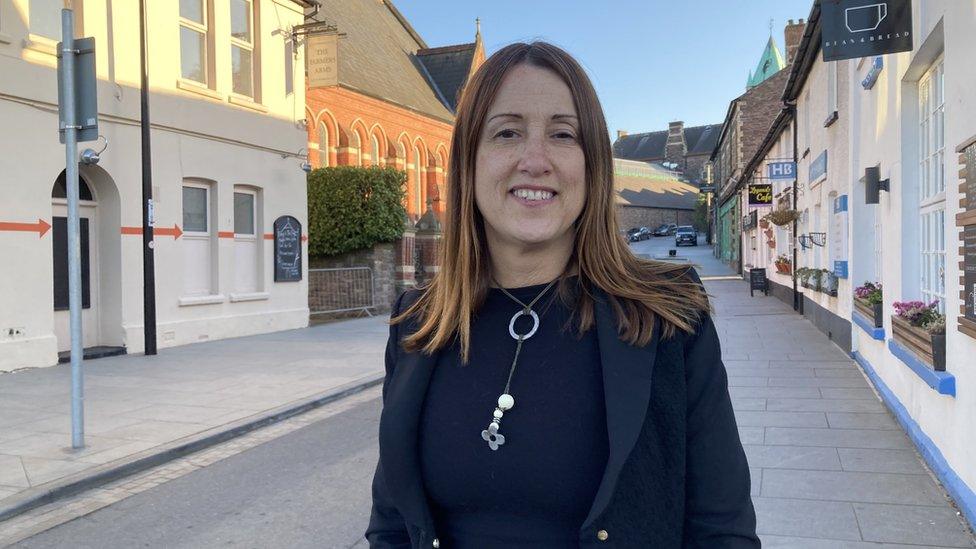
Lib Dem Jane Dodds says independent shops needed to continue being supported by politicians
The Welsh Conservatives aren't suggesting a revolution - instead they would bring in free parking and scrap business rates for small firms.
Mr George says people need to realise "our high streets are changing".
"What we've seen in Wales is that people are willing to shop more local and again we have to retain that," he says.
Small businesses have adapted well in the pandemic, says Mr George, because they are more agile and change more easily, developing websites and offering click and collect.
So, are ideas like free parking and lower overheads enough to breathe life into struggling town centres?
Ms Dodds - standing in Abergavenny's town centre - says some independent shops selling essentials like "our butchers and small delis" have done well during the pandemic and need to continue being supported.
She has another vision of the future - the "15-minute city" - where, she says, we can "guarantee somebody has the bank, the post office and essential shops within a 15-minute walk of where they are".

POLICY GUIDE: Who should I vote for?
FIRST TIME: Will 16-year-olds vote?

- Published25 April 2021

- Published20 April 2021
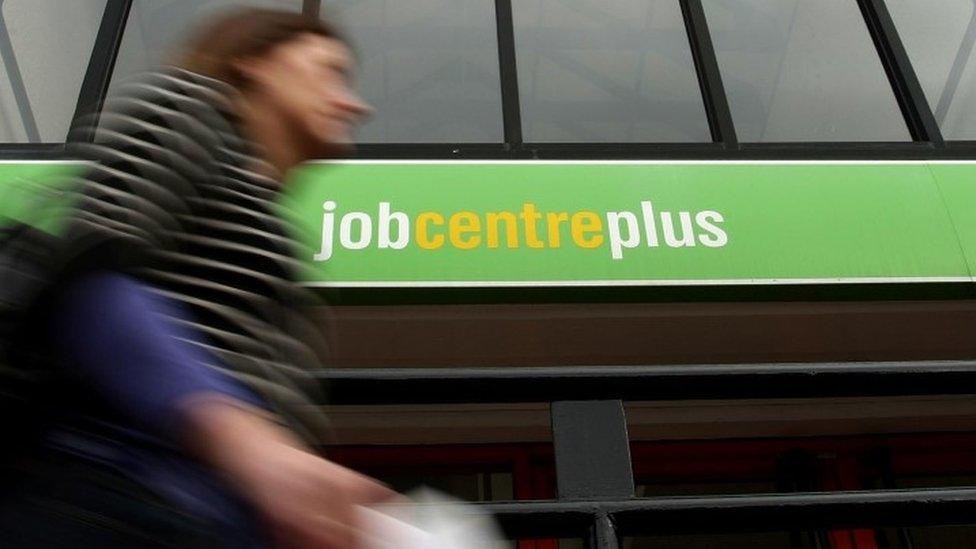
- Published21 March 2021
